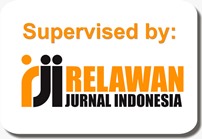THE INFLUENCE OF WORK-FAMILY CONFLICT ON EMPLOYEE PERFORMANCE WITH WORK-LIFE BALANCE AS AN INTERVENING VARIABLE
Abstract
Work-family conflict is a role conflict that arises between employees, on the one hand they have to work in the office, on the other hand they have to take care of the entire family, so it is difficult to differentiate between conflicts between work and family and between family and work. Work-family conflict is a conflict between work and family roles faced by employees. In this research, the population was determined, namely employees at the BUMN Bank PT The sampling technique in this research is a purposive sampling technique, meaning that not all samples can be used in the research. Purposive sampling technique is a sampling technique with certain criteria in research. The criteria were all female employees at the State-Owned Bank PT In sampling this research, the author used the Saturated sample formula, namely sampling if the entire population is used as a sample and is also known as a census. The research results found Work Family Conflict has a negative and insignificant effect on employee performance for employees of BUMN PT X Semarang City.Work Family Conflict has a positive and significant effect on Work Life Balance for employees of BUMN PT X Semarang City Work Family Conflict has a positive and significant effect on employee performance for employees of BUMN PT X Semarang City. This means that a high level of Work Family Conflict does not have a greater influence on Work Life Balance. Based on the test results using the SmartPLS application program version 3.2.9 (Smart Partial Least Square), it can be concluded that the indirect influence on the research model consists of the indirect influence on the Work Family Conflict variable on Employee Performance through Work Life Balance.
Keywords: Work Family Conflict, Work Life Balance, Employee Performance
Full Text:
PDFReferences
Bernardin, H. J., Cooke, D. K., & Villanova, P. (2000). Conscientiousness and agreeableness as predictors of rating leniency. Journal of Applied Psychology, 85(2). https://doi.org/10.1037/0021-9010.85.2.232
Byrne, D. (2005). Complexity, configurations and cases. Theory, Culture & Society, 22(5), 95–111.
Creswell, J. W. (2010). Research design pendekatan kualitatif, kuantitatif, dan mixed. Yogyakarta: Pustaka Pelajar.
Ermawati, S. (2016). Peran Ganda Wanita Karier (Konflik Peran Ganda Wanita Karier Ditinjau dalam Perspektif Islam). Jurnal Edutama, 2(2). https://doi.org/http://dx.doi.org/10.30734/jpe.v2i2.24
Ferdiansyah, M. A., & Faisal, F. A. (2020). Faktor-Faktor Nilai Perusahaan: Kajian Berdasarkan Modal Intelektual, Pertumbuhan dan Kinerja Perusahaan. E-Jurnal Akuntansi, 30(4), 911–921.
Greenhaus, J. H., Collins, K. M., & Shaw, J. D. (2003). The relation between work-family balance and quality of life. Journal of Vocational Behavior, 63(3). https://doi.org/10.1016/S0001-8791(02)00042-8
Hair, J. F., Black, W. C., Babin, B. J., & Anderson, R. E. (2013). Multivariate data analysis: Pearson new international edition PDF eBook. Pearson Higher Ed.
Huda, K., & Rahardja, E. (2021). Pengaruh Stres Kerja Dan Konflik Kerja-Keluarga Terhadap Kinerja Karyawan Melalui Kepuasan Kerja Sebagai Intervening Studi Pada Karyawan Bpjs Keternagakerjaan Banda Aceh. Diponegoro Journal Oof Management, 10(5).
Naibaho, Yusmansyah, & Utaminingsih. (2018). Hubungan Antara Regulasi Diri Dalam Belajar Dengan Rencana Pemiihan Karier. ALIBKIN, Jurnal Bimbingan Konseling, 5(6).
Pradana, L. R. (2019). Analisis Pengaruh Konflik Peran Ganda Terhadap Kinerja Dengan Stress Kerja Pegawai Wanita Sebagai Pemediasi Pada PT. Bank BRI, Tbk Area Jember. In Digital Repository Universitas Jember.
Rahmadita, I. (2013). Hubungan antara konflik peran ganda dan dukungan sosial pasangan dengan motivasi kerja pada karyawati di Rumah Sakit Abdul Rivai-Berau. Ejournal Psikologi Fisip, 1(1).
Rayhana, A., & Dudija, N. (2022). Pengaruh Work-family Conflict Dan Stres Kerja Terhadap Kinerja Karyawan (studi Pada Karyawan Wanita Rumah Sakit Surya Asih). EProceedings of Management, 9(3).
Rincy, V.M., Panchanatham, N. (2010). Development of a Psychometric Instrument To Measure Work Life Balance. Continenal Journal of Social Sciences, 3.
Sofyanty, D., & Purnomo, Y. J. (2022). Influence Of Promotion Of Position And Discipline On Performance In Employees At Pt Citra Karya Jabar Tol Sumedang Regency West Java. Journal Of Management, Accounting, General Finance And International Economic Issues (MARGINAL), 1(3), 73–110.
Tualai, M. M., & Aima, M. H. (2022). The Effect of Work - Family Conflict and Workload on Employee Performance Mediated by Work Stress on Female Employees With Families in the Fiscal Policy. Dinasti International Journal of Management Science (DIJMS), 3(4).
Utaminingsih, A. (2017). Gender dan wanita karir. Universitas Brawijaya Press.
Yavas, U., Babakus, E., & Karatepe, O. M. (2008). Attitudinal and behavioral consequences of work-family conflict and family-work conflict: Does gender matter? International Journal of Service Industry Management, 19(1). https://doi.org/10.1108/09564230810855699
DOI: https://doi.org/10.31846/jae.v12i2.789
Refbacks
- There are currently no refbacks.

This work is licensed under a Creative Commons Attribution-NonCommercial-NoDerivatives 4.0 International License.
e-Jurnal Apresiasi Ekonnomi Indexed by:












